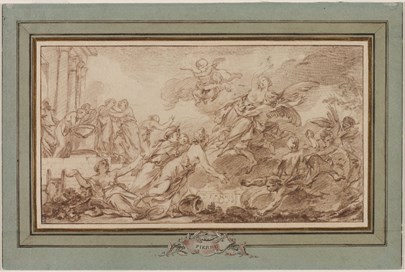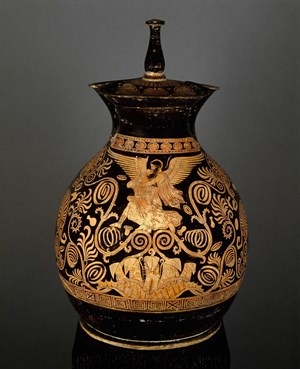Eumolpus was the son of Poseidon and Chione, daughter of Oreithyia, who was a daughter of Erechtheus, king of Athens. Boreas, the north wind, carried off Oreithyia from Athens to Thrace. According to Apollodorus, Chione gave birth to Eumolpus without Poseidon’s knowledge and threw her newborn baby into the sea to hide the fact. Fortunately, Poseidon saved Eumolpus and brought him to Ethiopia, where he entrusted him to Benthesikyme, daughter of Poseidon and Amphitrite. This bewildering story means that Eumolpus can be considered at the same time Greek, Thracian, and Libyan or a native of North Africa. Eumolpus married one of Benthesikyme's daughters when he grew up, even though he was in love with a different daughter. When he made an attempt at her chastity, he was banished and returned to Thrace with his son Immarados by the Oceanid Daeira.

Boreas abducting Oreithyia, Jean-Baptiste-Marie Pierre, ca. 1755-1760, engraving, The Cleveland Museum of Art © The Cleveland Museum of Art

The rape of Orithyia by Boreas, The Salting Painter, 360 BCE, vessel, Musée du Louvre © 1993 RMN-Grand Palais (musée du Louvre) / Hervé Lewandowski
Eumolpus' skill at becoming entangled in awkward social situations also manifested itself in Thrace. For example, he plotted to overthrow King Tegyrios, whose daughter had married Immarados and was forced to flee to Eleusis, where he became a local notable. Eumolpus was among the first Eleusinians to receive the secrets of the Mysteries, thus becoming the first priest of Demeter. He seems to have had a knack for it since his very name means “he who sings and dances well”. His descendants became known as the Eumolpidae and provided the chief priest of the Mysteries, the hierophant.
When Immarados died, King Tegyrios invited Eumolpus back to Thrace. He inherited the kingdom and ruled the Thracians when he received an appeal by the Eleusinians to come to their assistance. His former compatriots were at war with Athens and needed all the help they could secure. The traditions about the conflict between Eleusis and Athens are confusing and differ significantly. According to some accounts, the Athenians prevailed and killed Eumolpus with his two sons, Phorbas and Immarados. According to Pausanias, the battle cost the lives of King Erechtheus of Athens and Immarados. In the peace that ensued, Athens annexed Eleusis, but the descendants of Eumolpus maintained the right to celebrate the Mysteries and provide the chief priest. The third version of these events claims that Erechtheus killed Eumolpus but then perished himself when Zeus struck him with a lightning bolt to satisfy Poseidon for the loss of his son (or Poseidon accomplished the deed himself by making the earth open up and swallow Erechtheus). The Latin author Hyginus reported that Eumolpus came to Attica with a group of Thracians to avenge his father’s loss to Athena in the contest to own Athens.
The tomb of Eumolpus was shown both in Eleusis and in Athens. Over time, his name became associated with many traditions and mythical episodes. For example, since he was an excellent musician who could play the aulos and the lyre, he instructed Heracles in music and initiated him in the Eleusinian Mysteries. He also purified him of the murder of the Centaurs. Another mythological tradition claimed that Eumolpus’ youngest son, Keryx, became the founder of the genos of the Kerykes. He was said to have discovered the cultivation of the vine and other fruit trees. According to Diogenes Laertius, Eumolpus was the father of Musaeus, the legendary philosopher, historian, prophet, priest, poet, and musician.






